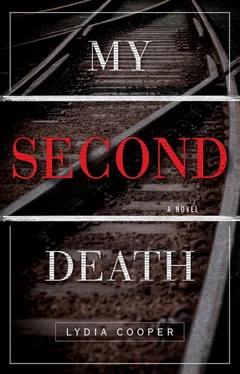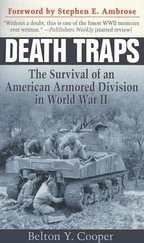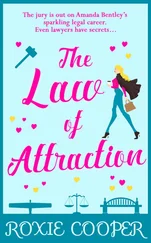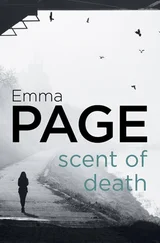“I said forget it.” I keep expecting to see that glaze of anticipation in his eyes when I talk about death, about murder and arson. I thought at first that he felt the same way I did about our cohabitational adventure, the sizzle of danger and death. But instead he just looks ignorant when I mention the house across the street or the fire, and he looks physically sick whenever I bring up his mother. Circumstantial evidence suggests that he may be a killer. A mutilator of corpses. But nothing else in his behavior seems to tally with the external coincidences of his apartment’s location and our sudden meeting.
As I lay awake listening to Aidan stumble through the living room last night, I realized that, while I don’t understand ordinary, decent human behavior, I also might not be able to understand sociopathic behavior. The realization was strangely disturbing.
I go over to the television and manually turn up the volume.
“Move over. I want to watch this.” I sit on the floor at the far end of the couch from him and open a binder full of digitalized illuminated manuscripts. The BBC announcer remarks in bland Home Counties tones about the deadly jaws of the crocodile. I laugh and when I look up Aidan is smiling too.
At night I lie awake in the dark and listen to Aidan come in, to his socked feet shuffle in the kitchen, the metallic creak of a can releasing, a hiss of air, a gurgle.
In the first amalgamation of Anglo-Saxon dialects, what we now call Old English, the word doom meant judgment. As if the ancient Germanic tribes had understood that fate was arbitrary, that acquittal and damnation alike fall on the unsuspecting regardless of their merit. But maybe our expression “impending doom” suggests that we understand something else, that all judgments are damnations, that there are no acquittals, no justifications, only tragedies. That once a person is a suspect they become guilty and carry their taint forever. I think Aidan wants me to tell him that his sister murdered his mother. I don’t know why. He already believes it’s true.
I fall asleep and dream that the cat has returned and is sitting on my chest looking at me with human eyes. The eyes are dark, black-lashed, luminous and tragic with hope. I realize that they are Aidan’s eyes and I startle awake. I hear him snoring in the living room, the sonorous rasp a counterpoint to the low static of the television.
Once when I was young, about eight maybe, my dad got pneumonia. He lay on the couch with his head propped up on a rolled pillow and my mom canceled her piano students and even upstairs in my bedroom — I lived in the house then — I could hear the tinny rattle of the TV punctuated by his wheezy coughs.
I was squatting on my haunches on the white shag rug in the middle of my bedroom, cutting a doll’s hair. I gripped the doll by its hair, her wide-eyed face and pinched waist spinning slowly, her tiny pointed feet dangling like bird claws. I sliced through the hair with a pair of scissors, and the doll fell. Yellow plastic hair scattered across the carpet. I picked up the doll by what was left of her hair and sheared it again. I don’t remember why I was cutting her hair that way, like some demented hangman passing the time at a cosmetology school. The door banged open and Dave came in. He was wearing a camouflage G.I. Joe thermal shirt. He grabbed the doll and wrestled the scissors out of my hand, pinching my thumb. He cut her head off with the scissors. I remember the chewy, gnawing sound the blades made in the stiff plastic. He gave me the scissors and the doll, and I grabbed hold of the cuff of his shirtsleeve and I cut his thumb. I would’ve kept sawing away at his thumb, but he screamed and Mom came running down the hall. I hid the scissors behind me. Dave tucked his thumb under his fingers and put his hand in his pocket.
“Mickey? Sweetheart? Dave, what happened, what did she do?”
Dave said, “Nothing.”
Mom looked at me and at my decapitated doll. I picked up the doll head and looked at the warped eyes. They looked startled.
“Honey? Are you okay?”
“I didn’t scream.”
“I know,” Mom said. She bent to touch me, kiss me, something. I put the fist holding the doll head between us and she stopped short.
She pursed her lips and then said, “Play nicely, please.”
When she left, Dave said, “Hey. You want to play outside?”
It was February. A brief thaw had started to melt the heavy icicles and every few hours another sheet of softened ice would slide off the roof and shatter on the wet lawn. But it was still only a few degrees above freezing. And Mom had been very particular about us staying inside once Dad got sick.
“Mom said no.”
“Don’t ask, don’t tell, that’s my policy,” Dave said.
“Why would I tell?”
“I don’t know,” Dave said. “Maybe you’re a quisling.”
“What’s a quisling?” I cut my doll’s head in half again, right through the painted blue-rimmed eyes.
“A weasel,” Dave said. “A tattle-tale.”
When I didn’t answer him right away, he said, “So yes? Or no?”
“Okay.”
“Cool. Hurry up. Before Mom gets back.”
I hadn’t realized she was leaving. Dave said she was going to the store. We went downstairs and I put the scissors in my back jeans pocket. I liked having scissors near me. When I looked at things — the photograph of our smiling faces over the stairwell doorway, the fern in the planter on the landing, the defrosting package of chicken breast on the countertop — I imagined the sounds they would make with the scissors chewing through them.
Dave pulled on sneakers without tying the laces and put his arms through a camouflage jacket that he loved because, he said, it made him “butch.” He put me into a snowsuit. It felt bulky, like I was waddling in a comforter. I didn’t like the feeling. His hands were cold and sticky.
“Don’t touch me.”
“Shut up.” He pulled a hat over my head and tied a scarf around my neck. Strands of hair got stuck in my eyes and across my mouth.
Dad said something from the living room but then started coughing so we couldn’t tell what he said. Dave turned around and put a finger to his mouth. His eyes shone like the sun refracted through prisms.
He opened the door softly and we went out. A sugary-white ice covered the yard and cracked like eggshells under our boots. I thought we were just going to play in the backyard but Dave wanted to go down the street to the cul-de-sac where a new house was under construction. We weren’t allowed down that way.
We trudged down the sidewalk, lifting our legs high to pull our boots free of the melting bog of ice and snow, robotic moonwalkers. My scarf rested against my lower lip. It was wet with mucus and saliva, slowly freezing over. I could taste the icicles forming against my mouth.
The site smelled fresh, like wet paint and sawdust. The mud in front of the house was churned up, crisscrossed with ridges from backhoe tread, the gashes filled with sloshing icewater. Coils of red plastic tubing lay across the bare dirt.
The basement had been dug and concrete poured, but the house frame hadn’t been erected yet. Rainwater had filled the basement during a heavy storm and then a shell of ice formed when the temperature dropped overnight. Pine needles and gravel sprinkled the white ice-crust. Dave ran to the low concrete base wall and screamed, “Don’t try to stop me! I’ve got nothing to live for!”
He stopped at the edge and looked over his shoulder at me.
I didn’t say anything.
He jumped in. The ice sheared apart. A wave of silty, brackish water lapped over the edge of the pit. He shrieked from the cold. I went over to the edge and looked down. Hair plastered to his skull, he rose up out of the water, pinched blued eye sockets, pink flares on his cheeks. An ancient water god rising from a dark world. He held up his arms and said to me, “I’ll catch you, Mickey. Jump.”
Читать дальше












